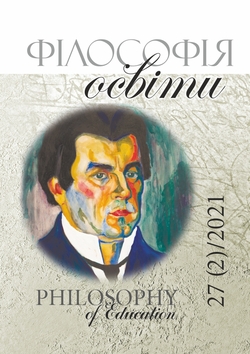Навчальні експерименти з використанням живих організмів: біоетичні обґрунтування корекції методик
DOI:
https://doi.org/10.31874/2309-1606-2021-27-2-6Ключові слова:
біоетика, досліди на тваринах, навчально-демонстраційні експерименти, екологія, ливарне виробництво, біомедична інженерія, гуманізм, філософія освітиАнотація
Актуальність теми статті зумовлена двома тенденціями, що простежуються у світі та в Україні: поширення науково-дослідницьких практик, що потребують осмислення в дискурсі біоетики, та спроби впровадження біоетики (або основних її ідей та принципів) в навчальний процес технічних університетів. Ці дві тенденції поєднуються в практиці використання тварин в наукових дослідах. Зважаючи на те, що складовою таких дослідів є не лише наукові, а й навчальні експерименти, це питання стає актуальною проблемою в дискурсі філософії освіти. Метою статті є презентація та аналіз досвіду корегування методик навчально-демонстраційних експериментів з використанням живих організмів, які проводяться в рамках підготовки фахівців з різних інженерних спеціальностей в Державному університеті «Одеська політехніка». Надано приклади проведення лабораторної роботи з вивчення впливу стічних вод з відвалів ливарного виробництва на живі організми (спеціальність 136-Металургія) та експерименту з вивчення впливу фотонного випромінювання на біооб’єкти у водному середовищі (спеціальність 163-Біомедична інженерія). В обох експериментах використовуються риби гупі (Poecilia reticulata Peters). Результати аналізу корекції методик експериментів з використанням живих організмів формують наукову новизну у трьох аспектах: 1) надано обґрунтування необхідності формування біоетичних компетенцій не лише для медиків та ветеринарів, а й для фахівців з різних інженерних спеціальностей; 2) запропоновано й апробовано додатковий принцип біоетики експериментів із використанням живих організмів - принцип дострокового припинення експерименту (навчально-демонстраційного) на певному етапі; 3) показано, що надання студентам можливості самим приймати рішення про зміни в процедуру експерименту формує виховну мету навчання з біоетичними компетенціями (розуміння меж необхідного та достатнього; готовність брати на себе відповідальність за результат експерименту і за чужі життя).
Посилання
Boichenko, N. & Pustovit, S. (2021). Review of the IX International Symposium on Bioethics “Health, Medicine and Philosophy: Survival Strategies” (Shupyk National Healthcare University of Ukraine, April 1516, 2021). [In Ukrainian]. Philosophy of Education 27(1), 261271. https://doi.org/10.31874/2309-1606-2021-27-1-15.
Chadaev, V. E. (2012). Ethical principles when working with laboratory animals. [In Russian]. Bulletin of problems of biology and medicine 92(2), 113114.
Croce, P. (1999). Vivisection or Science? An Investigation into Testing Drugs and Safeguarding Health. London; New York: Zed Books.
Grundy, D. (2015). Principles and standards for reporting animals experiments in the Journal of Physiology and Experimental Physiology. Experimental Physiology, June 16, 755-758. https://doi.org/10.1113/EP085299.
Denysenko, S.V. (2013). Bioethical treatment of laboratory animals in the process of studying. [In Ukrainian]. Actual Problems of the Modern Medicine: Bulletin of Ukrainian Medical Stomatological Academy 13(2), 241245.
Donika, A. D., & Shestakov, A. A. (2019). Bioethics of the XXI century: national interests and international studies. [In Russian]. Bioethics 23(1), 6062. DOI: 10.19163/2070-1586-2019-1(23)-60-62.
Editorial article. (2005). Seeking an End to Animal Experimentation. Deutsche Welle, August, 23. https://www.dw.com/en/seeking-an-end-to-animal-experimentation/a-1687760
"Front Matter". Institute of Medicine. (1991). Science, Medicine, and Animals. Washington: National Academies Press. https://doi.org/10.17226/10089.
Hubenko, H. (2020). Structuring Bioethics Education: Building Bioethical Potential, Experience, Practice. [In Ukrainian]. Philosophy of Education 26(2), 109120. https://doi.org/10.31874/2309-1606-2020-26-2-8.
Ivanova, L. A., & Prokopovich, L. V. (1996). Biomonitoring of the Foundry Industry’s Disposal Areas. [In Russian]. Foundry: Technology & Equipment 7, 21.
Kolodii, M. G., Korobov, A. M., Timaniyk, V. A., Titova, N. V., Burlibay, A., Omiotek, Z., Szatkowska, S., & Luganskaya, M. (2017). On the possibility of the patient’s skin overheating during low-intensive phototherapy. Photonics Applications in Astronomy, Communications, Industry, and High Energy Physics Experiments 2017: Proc. SPIE 10445. Wilga, Poland, 2017. https://doi.org/10.1117/12.2280961.
Korobov, A. M., Korobov, V. A., & Lisina, T. O. (2015). Phototherapeutic devices by Korobov A. and Korobov V. series “Barva”. [In Ukrainian]. Kharkiv.
Lazic, S. E. & Clarke-Williams, C. J. & Munafó, M. R. (2018). What exactly is “N” in cell culture and animal experiments? PLOS Biology (4), 114. https://doi.org/10.1371/journal.pbio.2005282.
Pavlov, S.V., Klapouschak, A.Y., Titova, N.V., & Baranovskiy, D.M. (2016). Mechanisms of electromagnetic radiation on the bio-object, which is in an aqueous medium. [In Ukrainian]. Photobiology and Photomedicine 13(1, 2), 139141.
Prokopovich, L. V. (2001). The Darcy’s law in foundry dumps ecosystem. [In Russian]. Proceedings of Odessa Polytechnic University (13), 1113.
Rollin, B. E. (2006). The Regulation of Animal Research and the Emergence of Animal Ethics: A Conceptual History. Theoretical Medicine and Bioethics 27(4), 285304. https://doi.org/10.1007/s11017-006-9007-8.
Soltis, J. F. (1981). “Introduction” in Philosophy and Education. Chicago: The University of Chicago Press.
##submission.downloads##
-
PDF
Завантажень: 501
Опубліковано
Як цитувати
Номер
Розділ
Ліцензія

Ця робота ліцензується відповідно до Creative Commons Attribution 4.0 International License.
- Автори, які публікуються у цьому журналі, згодні з такими умовами:
- Автори зберігають авторське право і надають журналу право першої публікації;
- Автори можуть укладати окремі, додаткові договірні угоди з неексклюзивного поширення опублікованої журналом версії статті (наприклад, розмістити її в інститутському репозиторії або опублікувати її в книзі), з визнанням її первісної публікації в цьому журналі.





